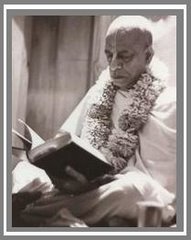 The system of Mahaprasad is not only emblematic of the superior life of the vaishnavas, but it is a part of the worship which ordinary theists cannot fully understand. The ordinary men are very much inclined to preserve the superiority of reason over the intuitive feelings of man towards the God of Love. We must now proceed to show with healthy arguments that our intuitive feelings want us to offer everything we eat to the Lord of our heart.
The system of Mahaprasad is not only emblematic of the superior life of the vaishnavas, but it is a part of the worship which ordinary theists cannot fully understand. The ordinary men are very much inclined to preserve the superiority of reason over the intuitive feelings of man towards the God of Love. We must now proceed to show with healthy arguments that our intuitive feelings want us to offer everything we eat to the Lord of our heart.We must first examine the arguments of the antagonists. The Rationalist holds that God is infinite and without wants, and consequently it is foolish to offer eatables to such a Being. It is a sacrilege to offer created things to the Creator and thereby degrade the Divinity of God into humanity. These are reasonable arguments indeed, and one who has heard them will certainly be inclined to declare to others, “Down with the Mahaprasad”. These conclusions, however reasonable, are dry and destructive. They tend to separate us from all connections with God in the form of worship. When you say that the Infinite wants nothing, you forbid all contemplation and prayer. The Infinite does not want your grateful expressions or, in other words, flattery. Utter a word to the Unconditioned and you are sure to degrade Him into a conditioned Being. Hymns, prayers and sermons are all over! Shut your temple door and the church gates, because our Rationalist has advised you to do so. Believe a creating principle and you have done your duty! Oh! What a shame! What a dreadful fall! Theists, beware of these degrading principles!
Now the Rationalist appears in another shape and admits prayers, sermons, psalms and church going, saying that these things are wanted for the improvement of the soul, but God does not want them at all. We are glad that the Rationalist has come towards us and will make further approaches in course of time.
Yes, the progressive Rationalist has admitted a very broad principle in Theology, viz. whatever we do towards God is for our own benefit and not for the benefit of God, who is not in want of any such thing. But the Rationalist is a Rationalist still and will continue to be so, as long as he will seek self interest.
We know for certain that religion promises to give eternal felicity to man and it is impossible to conceive of any religion which has not at its bottom self interest. This view however, smells of utilitarianism and can never claim to be theistic.
We must love God for God’s sake however unreasonable our action may be. Our love must be without any object whatever that concerns ourselves. This love must be a natural emotion to the Deity as our Lover without inference or experience. Salvation, dear as it is, should not be the object of this love: what then about other shapes of felicity? “Love of God” is its own reward. Salvation as a concomitant consequence, must be a hand-maid of Love, but we must not look on it as its main object. If the Rationalist be prepared to believe this, he becomes a Theist of the vaishnava class; but the mere assuming of the name is of no consequence.
Though fully aware that the unconditioned has no conditions whatever, yet our holy and sweet principle of love takes a quite different view of the matter. Reason says one thing but Love prescribes its contrary. Reason tells me that God has no sorrow, but Love sees God in tears for those of His sons that are misled to evil. Reason tells me that the strict laws of God reward and punish me in a cold manner, but Love reveals that God slackens His laws to the repentant soul! Reason tells me that with all his improvements, man will never touch the Absolute God; but Love preaches that on the conversion of the soul into a state of spiritual womanhood, God, the unconditioned as He is, accepts an eternal marriage with the conditioned soul of man! Reason tells me that God is in infinite space and time, but Love describes that the all-beautiful God is sitting before us like a respected relative and enjoying all the pleasures of society.
As a father in his amusements with his young children, God is spreading all sorts of delicious food all over the earth and expecting that His sons should gather all the scattered blessings and, without the exercise of reason in consequence of a strong feeling of love, offer all the blessings to the Father whom they love more than their lives. The Father again, in reply to their kind feelings, gives back the blessings to the children and tells them these kindlier words, “0! My children! These are blessings intended for you! Out of your natural love you bring them to me for my enjoyment; but I have naturally no wants to supply. But then I have accepted that part of your offering which corresponds with me, viz. your unmixed love and disinterested affections for which alone I am exceedingly anxious. Take back these sweet things and enjoy them”.
This process of disinterested love, which dry reason can never brook, sanctifies the food we take, and leaves us to harmless enjoyment for all the days of our natural life! This is a system of sincere worship which theists of a higher class alone can act upon. We cannot express the joy we often felt when we took the holy Mahaprasad in the temple! The holiness we attach to it is its sweetness and often pray that all men may enjoy it.
- Srila Bhaktivinode Thakur


















